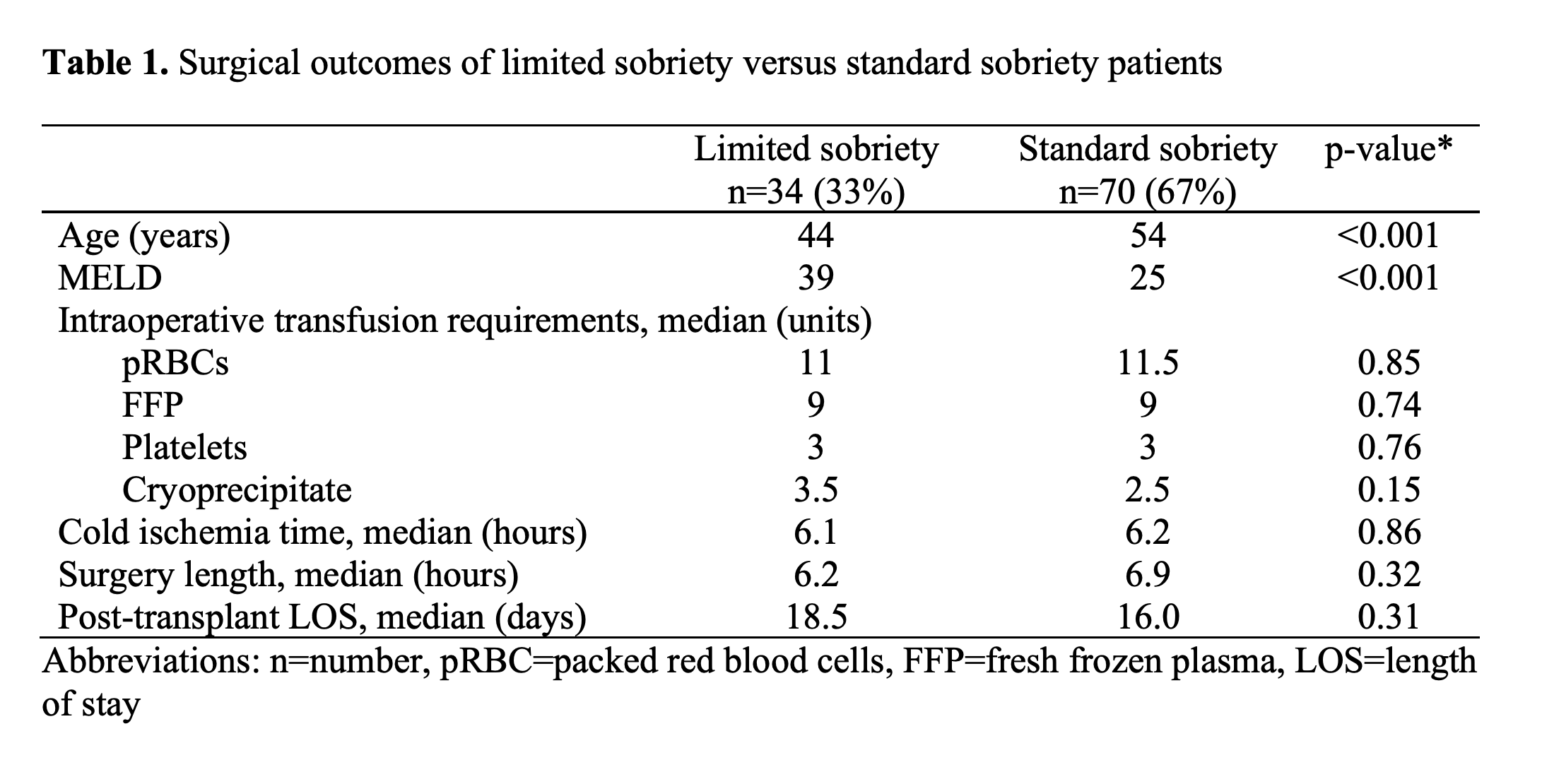Surgical Outcomes of Limited Sobriety versus Standard Sobriety Liver Transplantation for Alcohol-Associated Liver Disease
Stanford University Medical Center, Stanford, CA
Meeting: 2022 American Transplant Congress
Abstract number: 884
Keywords: Alcohol, Liver, Liver transplantation, Surgical complications
Topic: Clinical Science » Liver » 55 - Liver: Recipient Selection
Session Information
Session Time: 5:30pm-7:00pm
 Presentation Time: 5:30pm-7:00pm
Presentation Time: 5:30pm-7:00pm
Location: Hynes Halls C & D
*Purpose: Alcohol-associated liver disease (ALD) is now the leading indication for liver transplantation. While 6 months of abstinence has been conventionally required before transplant, this excludes many patients, some of whom may die during this waiting period. We hypothesized that recent alcohol use may be pro-inflammatory and may worsen surgical outcomes in patients with limited sobriety (less than 6 months) compared to standard sobriety (over 6 months).
*Methods: Adults who underwent a primary orthotopic liver transplant for ALD at a single institution from May 2018 to October 2021 were included. The primary outcomes were intraoperative blood product transfusion requirements, cold ischemia time, surgery duration and post-transplant length of stay. Patients in the limited sobriety group were compared to the standard sobriety group using Wilcoxon rank-sum tests.
*Results: Among the 104 liver transplant recipients with ALD, 34 patients had less than 6 months of sobriety. Compared to standard sobriety patients, the limited sobriety patients were younger (median of 44 years vs 54, p<0.001) and had higher MELD scores at transplant (39 vs 25, p<0.001). Limited and standard sobriety patients were similar in surgical outcomes; transfusion requirements (11.0 vs 11.5 units packed red blood cells, p=0.85), cold ischemia time (6.1 vs 6.2 hrs, p=0.86), length of surgery (6.2 vs 6.9 hrs, p=0.32) and post-transplant length of stay (18.5 vs 16.0 days, p=0.31).
*Conclusions: Despite significantly higher MELD scores at transplant, ALD patients with recent alcohol use do not have worse surgical outcomes compared to those with longer durations of sobriety. This may be due to a younger age and fewer co-morbidities. Our results indicate that liver transplantation in limited sobriety patients can be done safely and ultimately may allow more patients to undergo transplantation.
To cite this abstract in AMA style:
Fu* S, Pan* JH, Goel A, Kwong AJ, Melcher ML. Surgical Outcomes of Limited Sobriety versus Standard Sobriety Liver Transplantation for Alcohol-Associated Liver Disease [abstract]. Am J Transplant. 2022; 22 (suppl 3). https://atcmeetingabstracts.com/abstract/surgical-outcomes-of-limited-sobriety-versus-standard-sobriety-liver-transplantation-for-alcohol-associated-liver-disease/. Accessed February 22, 2026.« Back to 2022 American Transplant Congress

